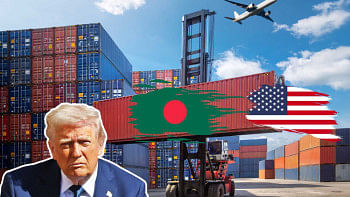Empowering rural communities through self-sustainability

Munaf Mojib Chowdhury is the Partner Director of HTTPool, one of Aleph Group's companies that provides local Meta advertising support. He aims to contribute to SDG goals, social welfare, and digital literacy throughout the country through different innovative initiatives, for which he came up with 'Ekshathe Foundation'. The Daily Star recently sat with him for a discussion about HTTPool, his experiences, and his ongoing project.
How do HTTPool's local operations contribute to the country?
In Bangladesh, we conduct a variety of activities, including training to improve Meta advertising-related activity optimisation. We also work on local payment facilitation. We receive the payment in BDT and transmit it in USD via Bangladesh Bank. Our major goal is to guarantee that foreign cash is used in the greatest possible way for advertising and growing business while also appropriately educating the market.
What are the places you have worked at?
I have worked in the corporate field for around 14 years. I started my job with an NGO, then joined Asiatic Events. After a few years there, I moved on to QUBEE, and subsequently to Ekhanei.com. After a few years of experience, I was hired as an Account Director by Asiatic. After that, I joined Axiata's ADA as a Business Development Director for four years before moving to HTTPool as a Partner Director, managing Bangladeshi operations.
How were you motivated to establish a foundation here?
Before my experiences with digital and technology-based business solutions, I worked for an NGO called Society for the Environment and Humanitarian Development. There was a professor who used to work with deforestation and indigenous communities. That was the first time the idea got in my head.
Also, during visits to my village, I noticed a few social issues there, which I realised I could help solve. One of the first problems I tackled was wood stove cooking. I thought of giving a sustainable solution to this method by specifically associating with the villagers. This is when I formed Eksathe Foundation.
Can you describe how this initiative works?
As we all know, wood stoves are harmful to both our health and the environment, top of being time-consuming. While considering a solution, I became aware of an innovation known as a biogas plant. So, we created a social innovation model. We selected a few village homes with 3-4 cows, developed a partnership with the owners, and installed biogas units there. We encouraged them to add cow manure in there and use that stove using the gas. We informed them that the bio-slurry produced by the process will be taken by us and you would be cooking on the stove.
What sort of positive impact it has created socially and how did you make a business out of it?
This initiative has a significant social impact since it enables rural residents to prepare food without endangering their health or the environment. Additionally, this cooking style produces a bi-product that is a natural fertiliser. As the number of dwellings increased, we began collecting bio-slurry, which is beneficial for agriculture. Even if it wasn't on a large scale, several industries connected with us and started purchasing it from us. The initiative turned into a green village endeavour that results in zero carbon emissions for a village if the entire community starts using it. This method will also make those communities self-sustaining..
What are your future plans with this project?
The bigger objective is to help make each village household self-sufficient. People, especially the next generation, should be able to stay in their village homes, earn a good living, live a comfortable life, and also contribute massively to the economic growth of the country and the world as a whole.
The immediate objective is to establish an organic fertiliser plant where the bio-slurry will be used as raw material, as well as to encourage locals to work there and increase employment. Thus, we plan to create an ecosystem that would eventually empower the village people in different ways.
To further empower people, I have launched another program called English Champ, through which people living in villages may learn English. Knowing proper English is something villagers, specifically freelancers living in villages, should be mindful of. Our freelancers have fallen behind because of a lack of English communication and comprehension, even though they are very competent at their jobs.
Such efforts require investments. Are you looking forward to receiving any?
I would love to find investors who are prepared to put money into the project, but the difficulty is that most investors want to see a return on their investment right away. However, if you look at the business model, you will see that it will provide you with a sizable return, but you might need to wait for that.

 For all latest news, follow The Daily Star's Google News channel.
For all latest news, follow The Daily Star's Google News channel. 



Comments